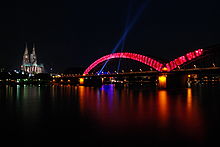German Protestant Church Assembly
You can help expand this article with text translated from the corresponding article in German. (September 2013) Click [show] for important translation instructions.
|


The German Evangelical Church Assembly (German Deutscher Evangelischer Kirchentag, DEKT) is an assembly of lay members of the Evangelical Church in Germany, that organises biannual events of faith, culture and political discussion. It sees itself as a free movement of people brought together by their Christian faith and engagement in the future of the Evangelical Church and wider society. The assembly partakes in bible study, lectures, and discussions, and also hosts concerts.
Pacifism
During the 1970s and 1980s, it was strongly affected by the peace movement and became a key platform for Christian pacifism.[1]
The Assembly's main mission is the holding of a five-day congress every two years, moving from city to city in Germany. These bring together around 100,000 visitors, who participate for the whole period. It was founded in 1949 and has achieved a high importance, as can be seen by many attending politicians, including Chancellor and Federal President. Angela Merkel has been a frequent guest to the Assembly. The media impact, while the Kirchentag is held, is also considerable.
Namesake
Between 1848 and 1872 conventions of Protestant clergy were held under the same German name as they are nowadays: Deutscher Evangelischer Kirchentag. For a description, see the Evangelical Church Conference.
References
External links
- Official Website
- www.kirchentag.org.uk British Committee of the Kirchentag
